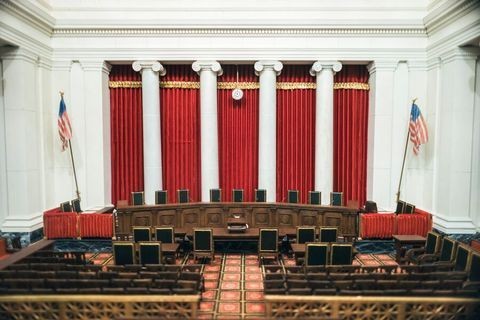Appellate
Overview
Thinking about appellate strategy early on—while a case is before the trial court or an agency—is a key part of how we approach litigation. Even if a case never ends up before an appeals court, clients need to be prepared, and a sharp appellate strategy makes for a sharper trial strategy.
Contacts
Insights
Firm News | 3 min read | 05.08.25
Senior DOJ Appellate Attorney Elizabeth Hecker Joins Crowell & Moring, Bolstering Education Practice
Elizabeth Hecker, former acting deputy chief and special litigation counsel in the U.S. Department of Justice’s Civil Rights Division’s Appellate Section, has joined Crowell & Moring as senior counsel in the Litigation Group. Hecker brings more than two decades of experience leading litigation in the federal court of appeals, with a focus on cases involving education and matters related to Title IV, Title VI, and Title VII of the Civil Rights Act of 1964, and Title IX of the Education Amendments of 1972.
Client Alert | 4 min read | 01.31.25
Publication | 01.15.25
Appellate: The Landscape of Pretrial Appeals Is Changing Rapidly
Firm News | 2 min read | 07.15.24
Representative Matters
United States Supreme Court
- County of Maui v. Hawaii Wildlife Fund (2019). We submitted an amicus curiae brief on behalf of industry and trade associations in this Clean Water Act case, seeking reversal of a Ninth Circuit decision applying point source permitting requirements to pollutants transmitted by groundwater.
- Trump v. Hawaii (2018). We submitted an amicus brief on behalf of a coalition of organizations serving domestic violence survivors in this challenge to an Executive Order barring entry to the U.S. from several Muslim-majority countries.
- Hughes v. Talen Energy Marketing (2016). We argued on behalf of the petitioner in this case arising under the Federal Power Act and concerning a state program encouraging the development of in-state electricity generation.
- West Virginia v. EPA (2016). On behalf of the National Rural Electric Cooperative Association, we helped to obtain an extraordinary Supreme Court stay of the Obama Administration’s Clean Power Plan for the duration of review by the D.C. Circuit.
United States Courts of Appeals
- M.L. Johnson Family Properties, LLC v. Bernhardt and Premier Elkhorn Coal LLC (6th Cir. 2019). After defeating a surface owning plaintiff’s attempts to use SMCRA to preclude our client’s ability to mine its underlying coal before the Interior Department and the district court, we successfully defended those victories before the court of appeals.
- Mexichem Fluor Inc. v. EPA (D.C. Cir. 2019 and 2017). We represented The Chemours Company in successive D.C. Circuit cases regarding the listing and delisting of chemical substitutes for ozone-depleting substances. Crowell attorneys authored a brief defending a regulation removing chemicals from the list of approved substitutes based on their global warming potential, and argued both cases.
- American Society for Testing and Materials v. Public.Resource.Org (D.C. Cir 2018). We wrote the brief for one of two sets of appellees in this consolidated copyright and trademark litigation.
- Arkansas v. EPA (8th Cir. 2017) and Utah v. EPA (10th Cir. 2017). We authored amicus briefs challenging EPA’s implementation of the Clean Air Act’s regional haze provisions on behalf of the Edison Electric Institute.
- Neumann v. Neumann (6th Circuit 2017). We obtained vacatur of a district court decision under the Hague Convention on the Civil Aspects of Child Abduction, preventing the separation of two minor children from their primary caregiving mother.
- Owens v. Republic of Sudan (D.C. Cir. 2017). We represented victims of the U.S. embassy bombings in Tanzania and Kenya, successfully arguing to affirm judgments against Sudan and Iran under the Foreign Sovereign Immunities Act’s terrorism exception.
- West Virginia v. EPA (D.C. Cir. en banc, argued 2016). We were the principal author of one set of petitioner-side merits briefs in this landmark challenge to the Obama Administration’s Clean Power Plan, and one of our partners was chosen by the challengers’ coalition to argue a significant portion of the case. A recent addition to our team from DOJ argued another part of the case for EPA.
State Appellate Courts
- In re Humphrey (California Supreme Court) – We are representing the Bar Association of San Francisco, the Los Angeles County Bar Association, and the Santa Clara County Bar Association as amici curiae in a landmark constitutional challenge to California’s money bail system. The case is anticipated to be argued in 2020.
- Yahoo Holdings, Inc. et al. v. Superior Court of the State of California (Calif. Ct. of Appeal, 2019). On behalf of Mozilla Corporation, we secured the summary dismissal of a petition for writ of mandate, thereby preserving a favorable trial court order regarding important attorney-client privileged documents.
- Warren v. Shelter Mutual (Louisiana Supreme Court, 2017). We argued successfully that a jury’s award of $23 million in punitive damages in a products liability case was excessive and unconstitutional. The court agreed and reduced the award to $4.25 million.
- MedStar Health, Inc. v. D.C. Department of Health (D.C. 2016). On behalf of a major health care system, we obtained reversal of a decision of the Office of Administrative Hearings (OAH) in a seminal case establishing the appropriate standard of review for OAH to apply in considering decisions of the Statewide Health Planning and Development Agency to grant or not grant a certificate of need.
Contacts
Insights
Firm News | 3 min read | 05.08.25
Senior DOJ Appellate Attorney Elizabeth Hecker Joins Crowell & Moring, Bolstering Education Practice
Elizabeth Hecker, former acting deputy chief and special litigation counsel in the U.S. Department of Justice’s Civil Rights Division’s Appellate Section, has joined Crowell & Moring as senior counsel in the Litigation Group. Hecker brings more than two decades of experience leading litigation in the federal court of appeals, with a focus on cases involving education and matters related to Title IV, Title VI, and Title VII of the Civil Rights Act of 1964, and Title IX of the Education Amendments of 1972.
Client Alert | 4 min read | 01.31.25
Publication | 01.15.25
Appellate: The Landscape of Pretrial Appeals Is Changing Rapidly
Firm News | 2 min read | 07.15.24
Insights
Professionals
Insights
Firm News | 3 min read | 05.08.25
Senior DOJ Appellate Attorney Elizabeth Hecker Joins Crowell & Moring, Bolstering Education Practice
Elizabeth Hecker, former acting deputy chief and special litigation counsel in the U.S. Department of Justice’s Civil Rights Division’s Appellate Section, has joined Crowell & Moring as senior counsel in the Litigation Group. Hecker brings more than two decades of experience leading litigation in the federal court of appeals, with a focus on cases involving education and matters related to Title IV, Title VI, and Title VII of the Civil Rights Act of 1964, and Title IX of the Education Amendments of 1972.
Client Alert | 4 min read | 01.31.25
Publication | 01.15.25
Appellate: The Landscape of Pretrial Appeals Is Changing Rapidly
Firm News | 2 min read | 07.15.24















